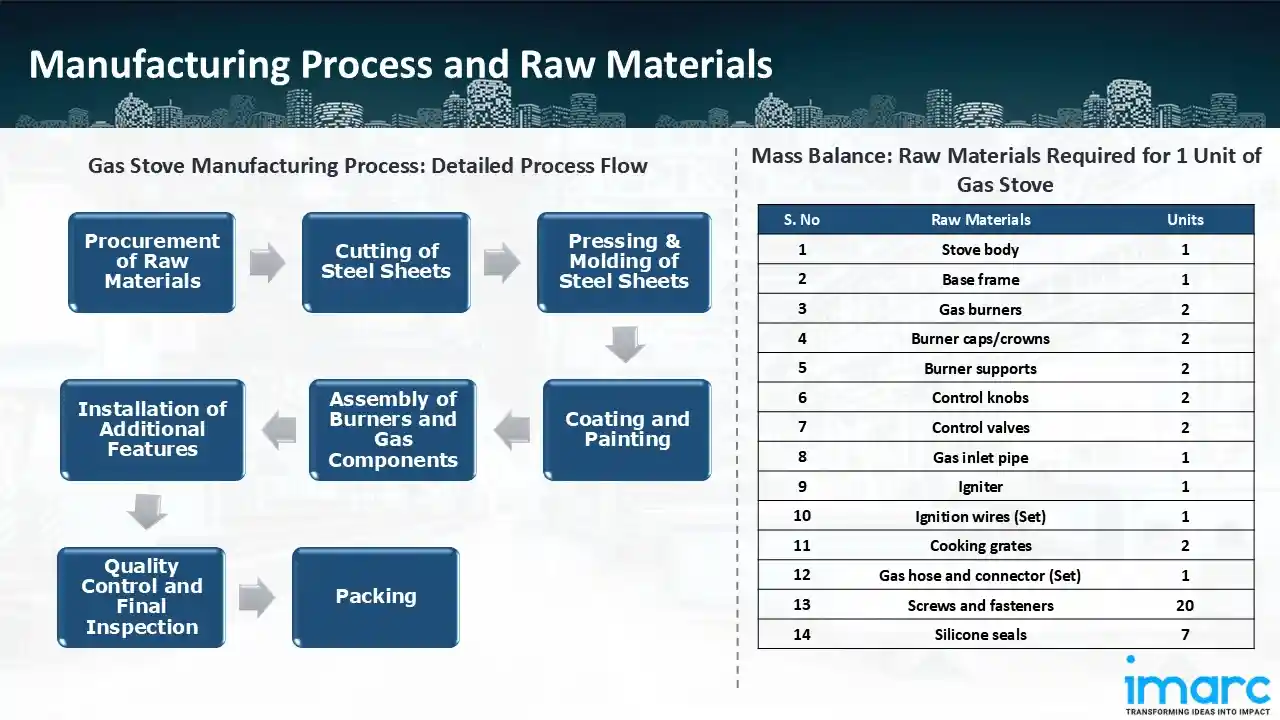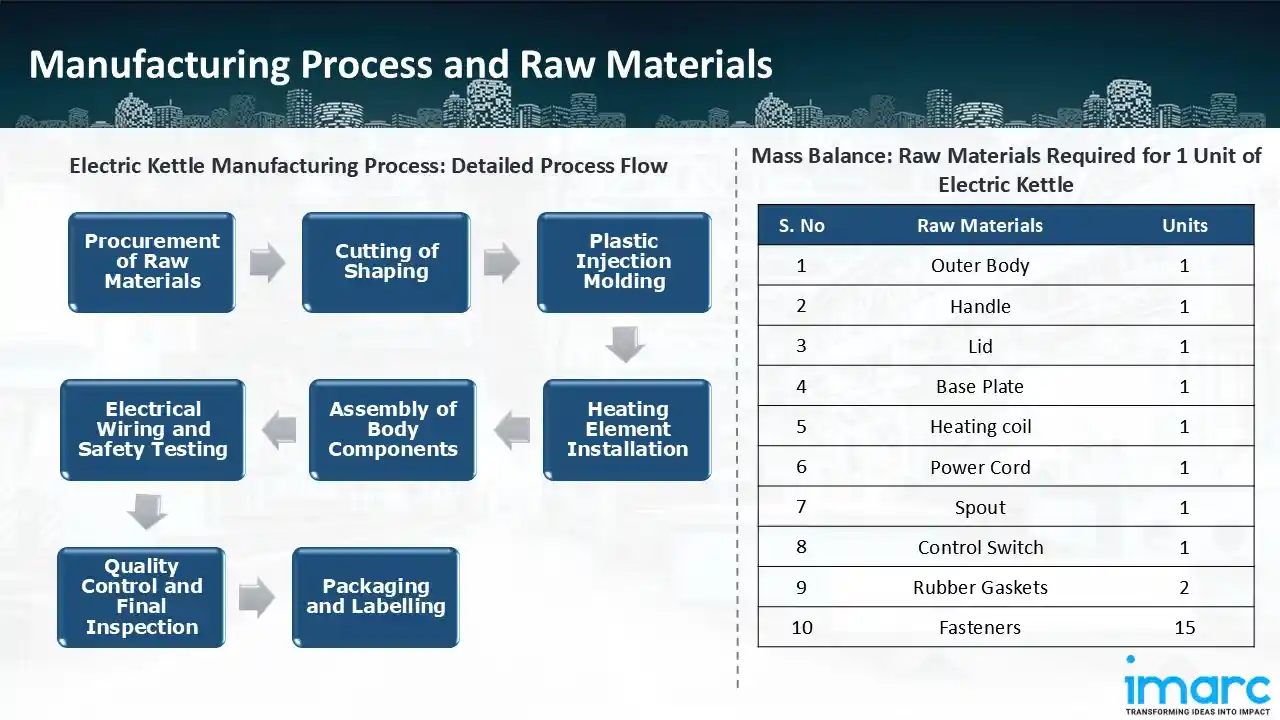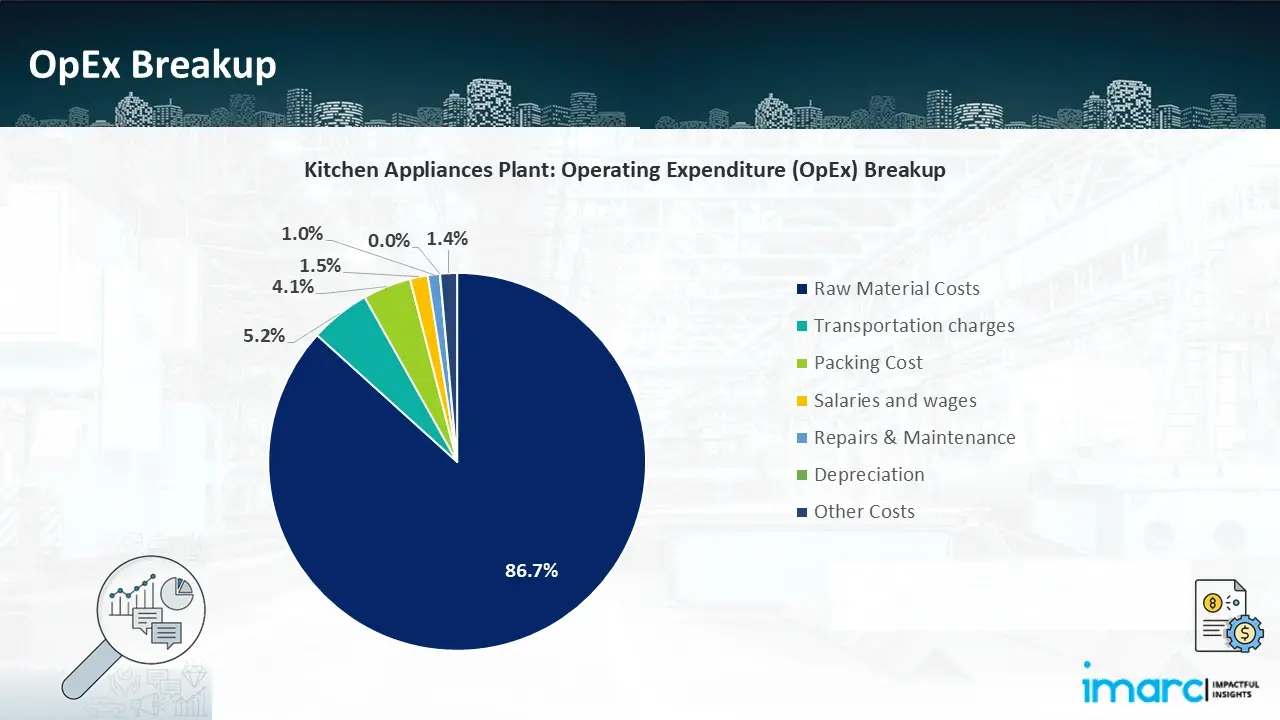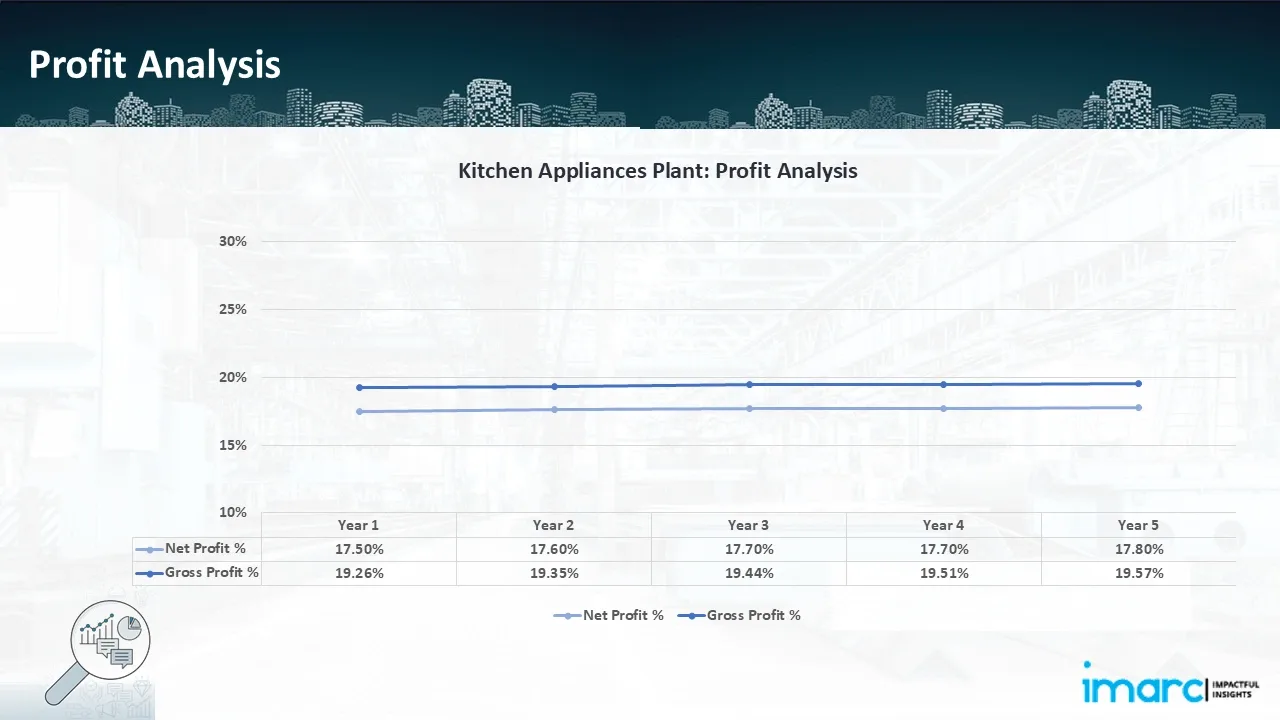Cost-Benefit Analysis of Kitchen Appliances Manufacturing Plant: A Detailed Cost Model
_11zon.webp)
What is Kitchen Appliances?
Kitchen appliances are a diverse category of electrical and mechanical devices that are essential in modern kitchens for various cooking and food preparation tasks. These appliances have revolutionized the way we prepare and cook food, making the process more efficient and convenient.
Key Applications Across Industries:
For instance, refrigerators are crucial for storing perishable foods and keeping them fresh. Ovens and stoves are fundamental for baking, roasting, and cooking on open flames or electric coils. Microwaves provide quick heating, cooking, and defrosting, saving time in the kitchen. Dishwashers automate the often-tedious task of cleaning dishes, while blenders and food processors simplify chopping, pureeing, and blending ingredients.
What the Expert Says: Market Overview & Growth Drivers
According to an IMARC study, the global kitchen appliances market size was valued at USD 243.0 Billion in 2024. Looking ahead, the market is expected to grow at a CAGR of approximately 4.82% from 2025 to 2033, reaching a projected value of USD 354.0 Billion by 2033. Consumers' increased environmental consciousness is the main factor propelling the growth of the kitchen appliances market. Additionally, consumers are searching for energy-efficient appliances to lower their carbon footprint and electricity costs, which is driving the market's expansion.
Consumer acceptance is being fuelled by manufacturers creating environmentally friendly products with enhanced energy-saving capabilities. Another significant reason driving growth is the convenience that smart technology integration into kitchen appliances provides through automation, remote control, and device connectivity. Products like smart coffee makers, stoves, and freezers are becoming more and more popular. In addition, consumers could now more easily access kitchen equipment and compare features and pricing thanks to the expanding internet purchasing platforms, which further increased demand for sales.
Case Study on Cost Model of Kitchen Appliances Manufacturing Plant:
Objective
One of our clients has approached us to conduct a feasibility study for establishing a mid to large-scale kitchen appliances manufacturing plant in UAE largely manufacturing gas stoves and electric kettle.
IMARC Approach: Comprehensive Financial Feasibility
We have developed a detailed financial model for the plant's setup and operations. The proposed facility is designed with a production capacity of 1,260,000 units of each of the product per year.
Manufacturing Process: The acquisition of raw materials, mostly premium steel sheets, is the first step in the manufacturing of gas stoves. The design parameters are then followed while cutting these sheets into exact sizes and shapes. The cut sheets are formed into the stove body and other structural elements by pressing and moulding them. The moulded parts are then painted and coated to increase their longevity and give them a finish that resists corrosion. To guarantee correct operation, burners and gas components such pipelines and valves are then put together and installed. Safety mechanisms, ignition systems, and knobs are among the other incorporated elements. Before the constructed gas stoves are packaged for market distribution, they go through a final inspection and quality control.

Get a Tailored Feasibility Report for Your Project Request Sample
Purchasing raw materials, such as plastic, stainless steel, and electrical components, is the first step in the creation of electric kettles. Cutting and shaping materials to create the kettle's body and base is the first step in the production process. Then, sturdy handles and exterior casings are made using plastic injection moulding. After that, the heating element is put in place at the base to guarantee effective water heating. The next step involves assembling the body's parts, including the base, lid, and spout. To guarantee correct operation and adherence to safety regulations, electrical wiring and safety testing are carried out. Before the kettles are packaged and labelled for market distribution, they go through a final inspection and quality control.

Mass Balance and Raw Material Required: The primary raw materials utilized in the gas stove and electric kettle manufacturing plant include base frame, gas burners, burner supports, control knobs, igniter, ignition wires, screws, base plate, heating coil, power cord, spout, control switch, rubber gaskets, fasteners, handle, lid, etc. among others. To manufacture 1 unit of gas stove, we require 1 unit of stove body, 1 unit of base frame, 2 units of gas burners, 2 units of burner caps/crowns, 2 units of burner supports, 2 units of control knobs, 2 units of control valves, 1 unit of gas inlet pipe, 1 unit of igniter, 1 unit of ignition wires, 2 units of cooking grates, 1 unit of gas hose and connector, 20 units of screws and fasteners, and 7 units of silicon seals. To manufacture 1 unit of electric kettle, we require 1 unit of outer body, 1 unit of handle, 1 unit of lid, 1 unit of base plate, 1 unit of heating coil, 1 unit of power cord, 1 unit of spout, 1 unit of control switch, 1 unit of rubber gaskets and 15 units of fasteners.
List of Machinery:
The following equipment was required for the proposed plant:
- Supporting Frame
- Guide Rail
- Tripple Speed Chain
- Conductive Bar
- Air Pipe
- Lightning Frame
- Tube
- Instruction Board
- Aluminimum Hanger
- Leveling Feet
- 2HP1: 100 Motor
- Lift Transfer
- Stopper Cylinder
- Pallet
- PLC
- Packaging Line (Conveyor Belt)
- Welding machine pot spot welding machine
- Spout multi-point automatic welding machine
- Heating plate glue on machine
- Rolling Machine
- Auxiliary equipment
Techno-Commercial Parameter:
- Capital Investment (CapEx): Capital expenditure (CapEx) in a manufacturing plant includes various investments essential for its setup and long-term operations. It covers machinery and equipment costs, including procurement, installation, and commissioning. Civil works expenses involve land development, factory construction, and infrastructure setup. Utilities such as power, water supply, and HVAC systems are also significant. Additionally, material handling systems, automation, environmental compliance, and safety measures are key components. Other expenditures include IT infrastructure, security systems, and office essentials, ensuring operational efficiency and business growth.
- Operating Expenditure (OpEx): Operating expenditure is the cost incurred to operate a manufacturing plant effectively. OpEx in a manufacturing plant typically includes the cost of raw materials, utilities, depreciation, taxes, packing cost, transportation cost, and repairs and maintenance. The operating expenses are part of the cost structure of a manufacturing plant and have a significant effect on profitability and efficiency. Effective control of these costs is necessary for maintaining competitiveness and growth.

- Profitability Analysis Year on Year Basis: The proposed kitchen appliances plant, with a capacity of 1,260,000 units of gas stove and electric kettle each annually, achieved an impressive revenue of US$ 105.8 Million in its first year. We assisted our client in developing a detailed cost model, which projects steady growth, with revenue rising throughout the projected period. Moreover, gross profit improved from 19.26% to 19.57%, and net profit rise from 17.50% to 17.80%, highlighting strong financial viability and operational efficiency.

Conclusion & IMARC's Impact:
Our kitchen appliances manufacturing plant's financial model was meticulously modelled to satisfy the client's requirements. It provided a thorough analysis of production costs including capital expenditures, manufacturing processes, raw materials, and operating costs. The model predicts profitability while accounting for market trends, inflation, and any shifts in the price of raw materials. It was created especially to satisfy the demand of producing 1,260,000 units of gas stove and electric kettle each annually. Our commitment to offering precise, client-cantered solutions that ensure the long-term success of significant industrial projects by giving the client useful data for strategic decision-making is demonstrated by this comprehensive financial model.
Latest News and Developments:
- In September 2024, Midea introduced the Celestial Flex Series, the first cordless kitchen appliances utilizing the Ki wireless power transfer standard. The kettle, steamer, and blender in this series are wireless devices that use induction plates, demonstrating advancements in kitchen appliance technology.
- In August 2024, Cuisinart has launched the SoHo Collection, a new line of kitchen appliances designed to simplify morning routines. The series caters to customers seeking efficiency and style in their kitchens with its sleek, contemporary designs and easy-to-use functionality. Cuisinart's dedication to home appliance innovation is demonstrated by this debut.
- In June 2024, Havells India partnered with Jumbo Group to launch its presence in the UAE's kitchen appliances market. By taking advantage of Jumbo's robust distribution network in the area, this calculated move will assist Havells in growing its global presence. The business intends to launch a line of high-end kitchen equipment to meet the UAE market's increasing need for inventive and superior goods.
- In April 2024, Whirlpool Corporation and Arçelik A.S. finalized their merger, resulting in the formation of Beko Europe B.V., a new appliance company based in Europe. This entity combines the European operations of both companies, aiming to strengthen their market presence in the region.
- In October 2023, Usha International has launched a new range of premium kitchen appliances in partnership with Reliance Digital for nationwide distribution. The lineup includes high-end blenders, cooktops, and other modern kitchen essentials, targeting premium and tech-savvy consumers. This collaboration aims to strengthen Usha's presence in the growing Indian kitchen appliances market while leveraging Reliance Digital’s retail network for wider accessibility.
Why Choose IMARC:
IMARC's Financial Model Expertise: Helping Our Clients Explore Industry Economics
IMARC is a global market research company that offers a wide range of services, including market entry and expansion, market entry and opportunity assessment, competitive intelligence and benchmarking, procurement research, pricing and cost research, regulatory approvals and licensing, factory setup, factory auditing, company incorporation, incubation services, recruitment services, and marketing and sales.
Brief List of Our Services: Market Entry and Expansion
- Market Entry and Opportunity Assessment
- Competitive Intelligence and Benchmarking
- Procurement Research
- Pricing and Cost Research
- Sourcing
- Distribution Partner Identification
- Contract Manufacturer Identification
- Regulatory Approvals, and Licensing
- Factory Setup
- Factory Auditing
- Company Incorporation
- Incubation Services
- Recruitment Services
- Marketing and Sales
Under our factory setup services, we assist our clients in exploring the feasibility of their plants by providing comprehensive financial modeling. Additionally, we offer end-to-end consultation for setting up a plant in India or abroad. Our financial modeling includes an analysis of capital expenditure (CapEx) required to establish the manufacturing facility, covering costs such as land acquisition, building infrastructure, purchasing high-tech production equipment, and installation. Furthermore, the layout and design of the factory significantly influence operational efficiency, energy consumption, and labor productivity, all of which impact long-term operational expenditure (OpEx). So, every parameter is covered in the analysis.
At IMARC, we leverage our comprehensive market research expertise to support companies in every aspect of their business journey, from market entry and expansion to operational efficiency and innovation. By integrating our factory setup services with our deep knowledge of industry dynamics, we empower our clients to not only establish manufacturing facilities but also strategically position themselves in highly competitive markets. Our financial modeling and end-to-end consultation services ensure that clients can explore the feasibility of their plant setups while also gaining insights into competitors' strategies, technological advancements, and regulatory landscapes. This holistic approach enables our clients to make informed decisions, optimize their operations, and align with sustainable practices, ultimately driving long-term success and growth.
Our Clients
Contact Us
Have a question or need assistance?
Please complete the form with your inquiry or reach out to us at
Phone Number
+91-120-433-0800+1-201-971-6302
+44-753-714-6104











